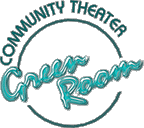More Ways to Help
Holding Book , Part 5
|
- Set the show back on course should things go haywire
during a rehearsal.
Lines and blocking are sometimes forgotten
in first rehearsals off book. When things have completely
stalled, you will need to know where they went wrong
and help the director get the rehearsal back on track.
As always, discuss this with the director before you
start. Some don't want the bookholder to say a word
unless asked. Others allow you to use your good judgment
to let them know when things have really gone off the
deep end.
|
- Read lines for an actor who is absent from rehearsal.
As is sometimes
the case with community theater, actors miss rehearsal
for a variety of reasons. You can help out the cast
and the actors by reading the missing actor's
lines. This is generally done from your seat in the
house. Read the lines clearly and loudly enough for
the actors on stage to hear. Don't try to read like
you're gunning to be a replacement.
|
|
|
- A special note to stage managers.
Bookholding is an excellent way for
stage managers to be even better at their jobs. Why?
Because you will be completely familiar with all elements
of the play. You will have first hand experience with
the dialog, the sound cues, the light cues, the entrances,
and the exits. And you will know the possible rough
spots to watch for. There is nothing like knowing that
it's usually about page 52 where those folks up on stage
often decide to shorten up the play by skipping to page
57.
|
|
Nobody will ever say that bookholding
is the most exciting job in the theater, but it is an important
task. For newcomers, it offers invaluable opportunities
to learn about getting a play from first rehearsal to opening
night. And for experienced community theater participants,
bookholding provides a chance to learn how different directors
and actors work, even as you are helping out your group.
So grab a script, some pencils, a BIG eraser, and a really
tough hide-then get out there and hold that book!
Back to beginning of article
|
|

|